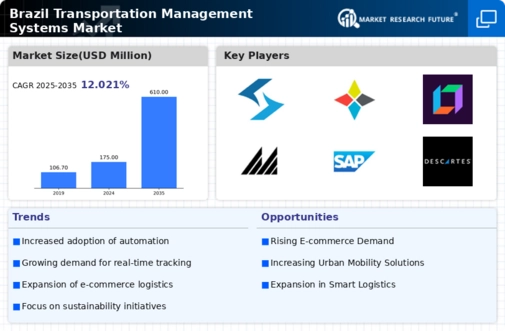Rising E-Commerce Demand
The surge in e-commerce activities in Brazil is driving the transportation management-systems market. As online shopping continues to gain traction, logistics and supply chain efficiency become paramount. Companies are increasingly adopting transportation management systems to streamline their operations, reduce costs, and enhance customer satisfaction. In 2025, the e-commerce sector in Brazil is projected to reach approximately $30 billion, necessitating robust transportation solutions. This growth compels businesses to invest in technology that can optimize delivery routes, manage inventory effectively, and provide real-time tracking. Consequently, the transportation management-systems market is likely to experience significant growth as companies seek to meet the demands of a rapidly evolving retail landscape.
Increased Regulatory Compliance
The transportation management-systems market in Brazil is also being shaped by the need for increased regulatory compliance. With evolving regulations regarding safety, emissions, and labor practices, companies are compelled to adopt systems that ensure adherence to these standards. For instance, the Brazilian government has implemented stricter regulations on vehicle emissions, prompting logistics firms to invest in technology that can help monitor and report compliance. This trend indicates a growing recognition of the importance of regulatory adherence in maintaining operational integrity. Consequently, the demand for transportation management systems that facilitate compliance is likely to rise, further driving market growth.
Growing Focus on Cost Efficiency
In Brazil, businesses are increasingly prioritizing cost efficiency, which is significantly influencing the transportation management-systems market. Companies are under pressure to reduce operational costs while maintaining service quality. Transportation management systems offer tools for route optimization, load planning, and carrier selection, which can lead to substantial savings. A recent study indicates that organizations utilizing these systems can reduce transportation costs by up to 15%. As Brazilian companies strive to enhance their bottom line, the adoption of transportation management systems is likely to rise, reflecting a broader trend towards operational efficiency in the logistics sector.
Government Infrastructure Investments
Brazil's government has been actively investing in infrastructure development, which is expected to bolster the transportation management-systems market. Initiatives aimed at improving road networks, ports, and rail systems are likely to enhance logistics capabilities across the country. For instance, the government allocated approximately $10 billion for infrastructure projects in 2025, which could lead to increased efficiency in freight movement. Improved infrastructure not only facilitates smoother transportation but also encourages businesses to adopt advanced management systems to optimize their operations. As a result, the transportation management-systems market is positioned to benefit from these investments, as companies seek to leverage enhanced infrastructure for competitive advantage.
Technological Advancements in Logistics
Technological advancements are playing a crucial role in shaping the transportation management-systems market in Brazil. Innovations such as artificial intelligence, machine learning, and the Internet of Things (IoT) are being integrated into logistics operations, enhancing efficiency and decision-making. For example, AI-driven analytics can provide insights into traffic patterns and delivery times, allowing companies to optimize their transportation strategies. As Brazilian businesses increasingly recognize the potential of these technologies, the adoption of advanced transportation management systems is expected to accelerate. This trend suggests a shift towards more data-driven logistics operations, which could significantly impact the market landscape.
















